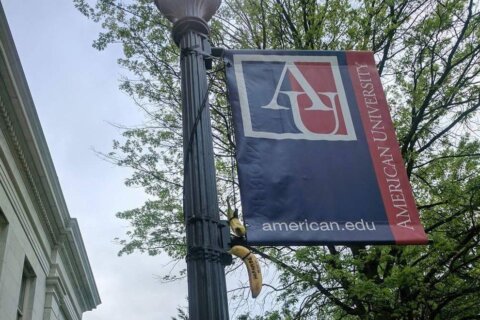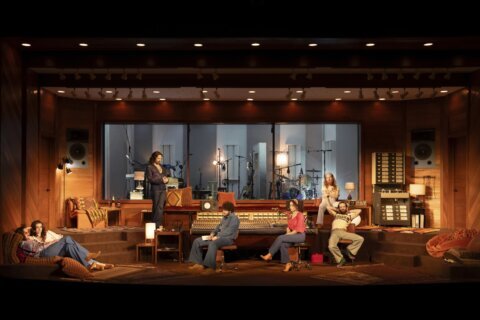WASHINGTON (AP) — The hanging of bananas from nooses with hateful messages at American University in Washington, apparently targeting the first black woman to serve as the student body president, prompted members of Congress to call for federal civil rights investigations on Thursday.
At least five bananas with nooses were found hanging from trees and lampposts around campus on Monday, Taylor Dumpson’s first full day as student president.
The FBI said Thursday that it is assisting a hate-crime investigation opened by campus police. The bananas included messages targeting Dumpson’s historically black Alpha Kappa Alpha sorority, along with the words “Harambe bait,” referring to the gorilla at the Cincinnati Zoo that was shot and killed after a child fell into its enclosure.
Rep. Sheila Jackson Lee, a Texas Democrat, and other members of Congress who are Alpha Kappa Alpha alumni called on Education Secretary Betsy DeVos and Attorney General Jeff Sessions to denounce and investigate the incident. They said President Donald Trump should speak out as well.
“What happened at American University is tragic. A young woman’s historic achievement has been clouded by hatred and bigotry,” said Rep. Alma Adams, a North Carolina Democrat. “This incident is just the latest in a string of atrocities sweeping our nation. It’s not a coincidence since President Trump’s election that we’ve experienced a wave of intolerance and divide.”
A report by the Department of Education’s civil rights division found that complaints of racial harassment on college campuses had more than doubled between 2009 and 2016.
Some have led to federal prosecutions. One of two former University of Mississippi students was sentenced to probation last year for placing a noose on the statue of James Meredith, the school’s first black student. The other was sentenced to six months in prison.
Just this week, officials at the University of Maryland, about 9 miles from the AU campus, said a noose was found inside a fraternity house. That, too, is being investigated as a hate crime. And last September at AU, white students were accused of placing bananas outside the doors of two black women’s dorm rooms.
Dumpson has said she was disturbed by racist comments on a messaging app that were traced to the campus during her freshman year, and that she considered transferring. Flanked by members of Congress outside the Capitol on Thursday, she made her first extensive comments about this week’s case, saying she hopes it can be a “catalyst for change” that leads the university to a more unified response to acts of bias on campus.
“At the end of the day, this isn’t just AU. This isn’t just about me. This is a broader issue that impacts everyone,” she said. “As a community, as a nation, we are never going to get anywhere if we do not talk about the uncomfortable truths that lie ahead. We are not in a post-racial society, unfortunately.”
Overflow crowd for AU town hall meeting
After her appearance on Capitol Hill, Dumpson led a town hall meeting on the hate crime, which drew an overflow crowd to AU’s Mary Graydon Center.
“We have all had enough of being attacked for who we are,” she said.
“As a community, let’s lead by example and set the tone for other universities to follow around the world.”
Student Lauren Lumpkin said it’s not clear what happens after a student reports a bias incident on campus.
“I feel like right now, it’s just a big mystery,” she said.
Another student, Natalie Hedden, said it’s “absurd” that there isn’t better surveillance camera video of the person of interest in the case.
“I just find it interesting that there aren’t more [surveillance cameras] located on the major buildings on campus,” she said. “If there was one on the outside of [Mary Graydon Center], we would have been able to literally see this person.”
Members of the audience also suggested that more professors of color should be hired, that university police should conduct more foot patrols at night, and that AU should start reporting the number of hate- or bias-related incidents on campus — something it does not do now.
Following the town hall, members of student government held a closed-door meeting with university leaders.
At the end of that second meeting, Terry Flannery, the university’s vice president for communication, spoke to the media. She praised the town hall meeting, and said the concerns that were voiced fell into five categories: communication, action, responsibility, transparency and accountability.
“There are items in each category that … we could make progress probably very quickly, because they’re areas where there are good answers,” Flannery said. “And clearly we’re not getting clear, effective information out to students about things they want and need.”
Administrators, Flannery said, will review feedback from “both the university and student government leadership” before deciding next steps.
WTOP’s Michelle Basch contributed to this report.
Copyright © 2026 The Associated Press. All rights reserved. This material may not be published, broadcast, written or redistributed.






